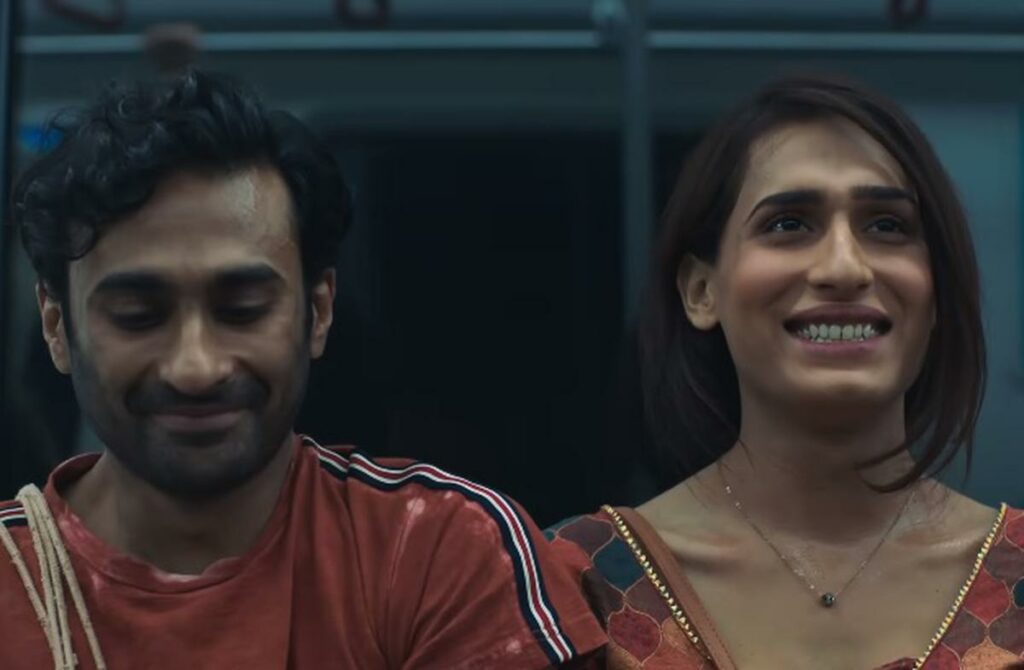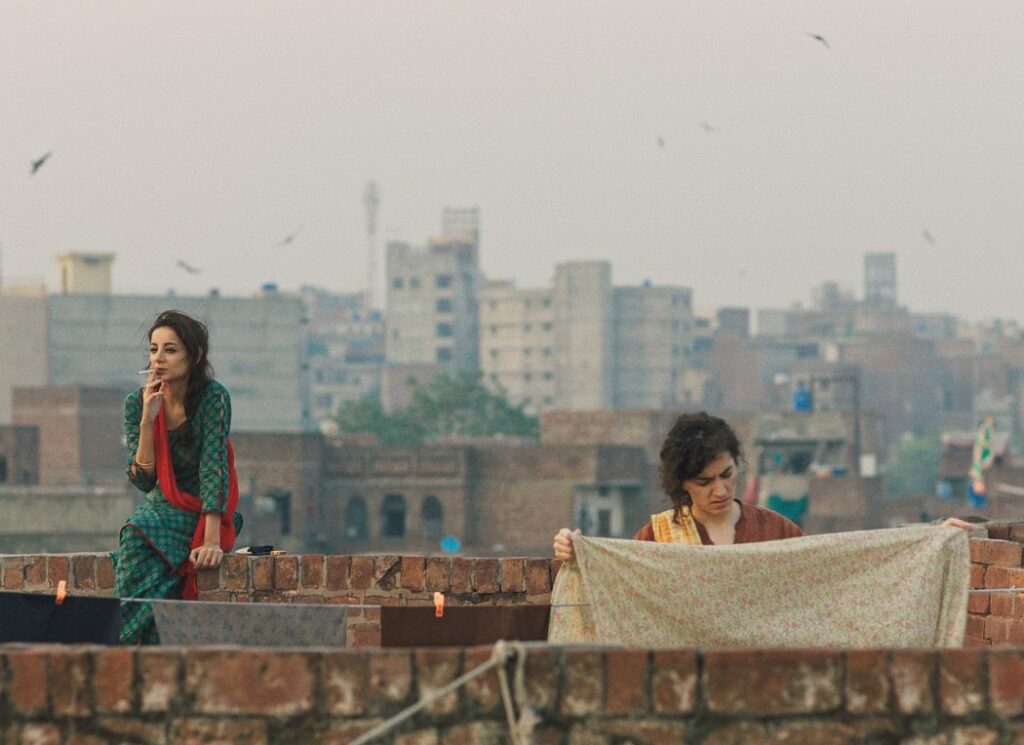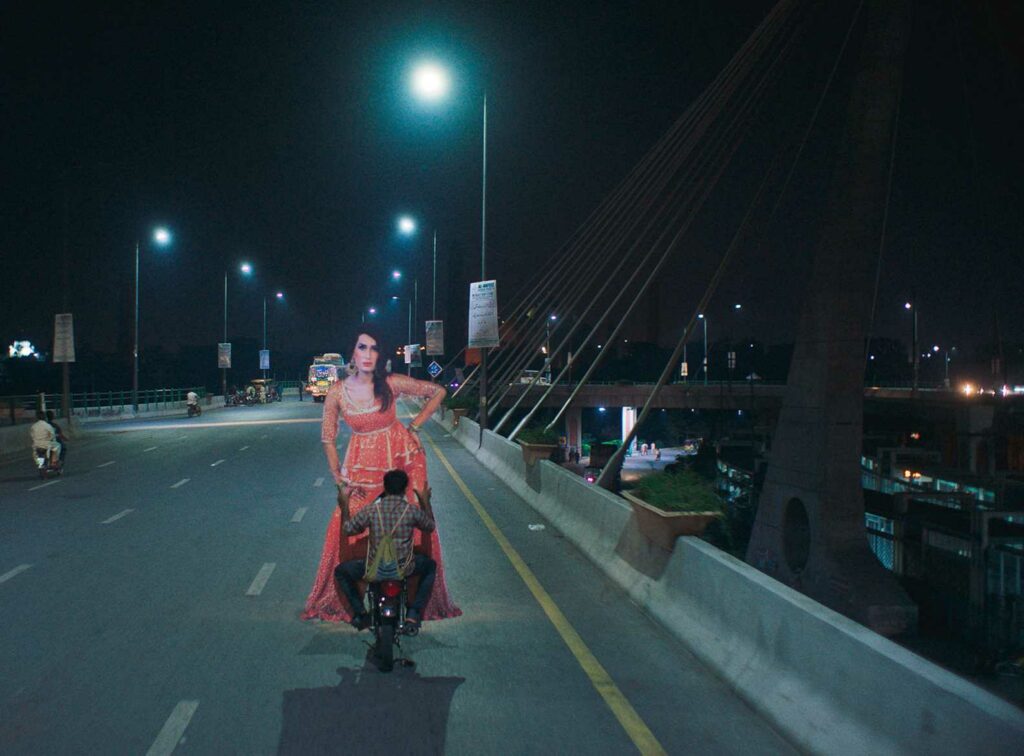Despite being the first Pakistani film to be shortlisted for the Academy Awards’ Best International Feature Film and the first to premiere at Cannes (where it won the Un Certain Regard award), Saim Sadiq’s feature debut Joyland was banned in its home country.
Joyland tells the story of the Rana family in Lahore, and begins with a baby girl being born to a patriarchal family desperate for a boy. The head of the Rana family (Salmaan Peerzada) soon forces his daughter-in-law (Rasti Farooq) to quit her job and focus on giving him a grandson. Meanwhile, the youngest of the Rana men (Ali Junejo) secretly joins an erotic dance theatre and finds himself falling in love with trans starlet Biba (Alina Khan), even as the former cannot fathom his own feelings.
Through this family saga, Sadiq observes how a society’s gender roles and expectations restrict – and inevitably, choke – individuals within it. The Ranas’ various journeys slowly illuminate their need for sexual rebellion.

The Pakistan government banned Joyland’s domestic release less than a week before its scheduled debut. Following a campaign by the country’s right-wing party Jamaat-e-Islami, one of the party’s senators accused the film of being “against Pakistani values“, further stating that “glamorising transgenders in Pakistan… is a direct attack on our beliefs.” The sudden ban was met with harsh criticism, with executive producer and Nobel Prize winner Malala Yousafzai writing:
“Joyland is not activism posing as art; it doesn’t argue for a particular point of view or issue a call to action. The film treats each character with compassion, from the ageing grandfather imposing his will on his family to the young wife who wants more than the men around her are willing to give. It’s a film about the ways in which patriarchy hurts everyone — men, women and children. It’s a film about the healing powers of female friendship and solidarity. It’s a film about the costs of ignoring our own dreams to conform to society around us.”
In response to the backlash, the Pakistani government finally backtracked and reversed the ban, approving the film’s release with some minor cuts. However, Joyland remains banned in Punjab, Pakistan’s most populous province.
Outtake spoke with writer-director Saim Sadiq about his new film and the conversations it has generated.
Can you tell us about the inspiration for this script, which you worked on for six years?
Saim Sadiq: Retrospectively speaking, I do realise it’s a very personal film. It came from many, many years of living in Pakistan and living in a family structure that was, on one hand, very nurturing and loving and on the other, very stifling. You know, tradition offers comfort, but it can also become a prison that one is unable to escape or even deviate slightly from. And so for me, the idea of it – of the love triangle and the family drama – is completely fictional, but the emotional truth of it is something that kept me going. I think there’s a little bit of me in all the characters, so feeling-wise it’s quite autobiographical, even if the plot is certainly not. It’s a film that doesn’t feel like a film; it almost feels like an extension of myself.
Joyland has had quite a complicated road to release, with the Pakistani government first banning it, then unbanning it, yet it remains banned in the Punjab region. What was your reaction to these various developments as they arose?
Saim Sadiq: When the film got banned the first time, it was only six days before the planned release. We didn’t really have time to pause and process before reacting – we wouldn’t have gotten it out on time if we had. We didn’t want to become part of a long history of films getting banned and never seeing the light of day in Pakistan. And it also became a safety risk for us with the sorts of messages we were getting from the people who didn’t want the film to release; it became so important that these people actually see the film to understand that there’s nothing blasphemous about it. There’s nothing against religion and, at the end of the day, it’s really just a film. It may be uncomfortable for you to watch, in which case you don’t have to watch it.

But it was like the façade of the film, and the sensation around it was so much bigger than the film itself, in a way. We decided to get this film released, however we can. We took to Twitter and tried to get #releaseJoyland to trend, and we called everyone we knew who was politically linked to the Information Ministry or its various agencies. Then when the Punjab ban happened – the debate got so heated. It was on television every day on primetime, and they were discussing a movie instead of the hundred other things that they could be reporting on, but we were like, “this is half a win, half a loss, let’s settle for a bit”.
We released it everywhere except for Punjab and the weekend after, we tried to negotiate with the Punjab government; we showed them the film again and again, and they were like, “we get it, it’s a good film. It’s fine. It’s just so political now that we don’t want to take a stance on it.” Then they suggested, “you should go to court, and we’ll send a bad lawyer and lose the case”. And we did, and the case was good. But we’re still in this loop of weird red tape and diplomacy and playing politics when we really should be making another movie!
There’s something to be said about the fact that, even in places where it was banned, people were still talking about the film.
Saim Sadiq: Even up until now. And it’s almost a better thing because the Punjab people feel robbed of it. It’s set in Punjab, I’m from Punjab, and I’m in Punjab right now, so it felt like a sad betrayal of some sort. If anything was going to do something good for Punjab, it was this: we filmed in Punjab, the film is in Punjabi – and very few films are –, and we filmed in Lahore even when the industry wasn’t located there. That all got overshadowed but, yes, people are talking about it a lot. I hope that means that when the film does release, audiences will come.
We’ve spoken about the battles you faced upon release, but were there many challenges in getting this film made in the first place?
Saim Sadiq: We were lucky. We had the film on the market for about two and a half or three years before shooting, which is a very good timeline for feature filmmakers. Especially since we were looking for money abroad, in the US and the UK, so we were very fortunate. Because it was a first-time film, it was going to be set and filmed in Pakistan, and it was of an ensemble nature, that all made it even harder.
A lot of people in the West had a much easier time wrapping their heads around the film if it was just about a trans love story because that’s something that they can fathom. They understand if it’s like Fantastic Woman, or like Tangerine. But no, it’s not that. Joyland has a trans character, but it’s a whole other film. That’s when they get confused [laughs].
That got us some rejections as far as money was concerned, but that was good. I didn’t see it as a challenge because, when partners did come aboard, it meant they understood the film for what it was.

You mentioned that you were born, grew up, and still live in Lahore, where Joyland is set. What kind of research did you undertake into your local trans community when writing the screenplay?
Saim Sadiq: I did a short film called Darling at the end of 2018, which was my thesis film when I was studying at Columbia. I already had the idea for Joyland at the time, so I decided to make my thesis piece a sort of snapshot of the world of theatre and trans dancers because those were the parts of Joyland that I wasn’t too familiar with. I needed to dip my toes into those and understand them, so I would go to the theatres and try to immerse myself. Not many theatres have had trans dancers, of course, but some of them do.
Apart from that, I think when we started casting about four or five months before the shoot of the short film, it was as much a casting process as it was a research project. I spoke to a lot of trans girls to understand their life stories and their political views, what they wanted to do with life, how welcomed or unwelcomed they felt, and whatever else they wanted to tell me. And we found Alina Khan, and she also became one of the biggest resources we had for Joyland not just as an actor, but as a consultant. We had two other consultants who read the script beforehand, but I think that during the shooting process, a lot of it was written with her insight. Biba is completely different from Alina – Alina is very polite and well-behaved, whereas Biba is rather abrasive and rude – but the insight into the trans experience came from her.
With Joyland, there’s no black-and-white narrative where trans characters are victims, and conservative characters are evil and immutable. Instead, you portray both sides with empathy and create room for understanding. Could you speak on the importance of having these conservative characters be presented without moral judgement and allowed to learn?
Saim Sadiq: I would say that in this day and age, it’s more important for us to do that. Let’s face it, filmmaking is largely an industry that is comprised of people who already have liberal views. A film like this will also get an audience that is already quite liberal and already believe in the ideas of the film. So to have liberal people make films about liberal ideas and paint conservatives as the bad guys – I don’t know what that says. Then we praise ourselves for furthering the conversation when the conversation is just going in circles: the same people are consuming the same ideas and praising each other for being so brave. But you’re not brave, because you’re not doing anything new. Try having empathy for a guy who’s hard to have empathy for – that’s brave.
I think that, when bringing conservative characters into a film that has a liberal point of view, it’s important to look at them with empathy and to see how they perhaps suffer from the consequences of their own morals. And we have to question whether it’s really fair to expect that, because times have changed in the last ten years, a 70-year-old man who’s always seen life through a certain prism should now completely and immediately erase 60 years of knowledge to adapt to this new way of living where everything he’s been told is good is actually bad. You can’t expect that change to happen so quickly.
The patriarch in the film, for example, has been raised to believe the patriarchy should be upheld for the good of everyone; we can’t turn him into a villain just because he’s not immediately buying into these liberal ideas to the contrary. We need to consider the fact that he understands some of the truthfulness of that, and he does suffer from it, but he also doesn’t know any better. It’s not that easy, especially living in a conservative society. So for me, the only way to tell that story honestly was to tell it through the prism of an almost exclusively conservative family, and not to look down on them.
Joyland releases in UK cinemas from February 24th.
